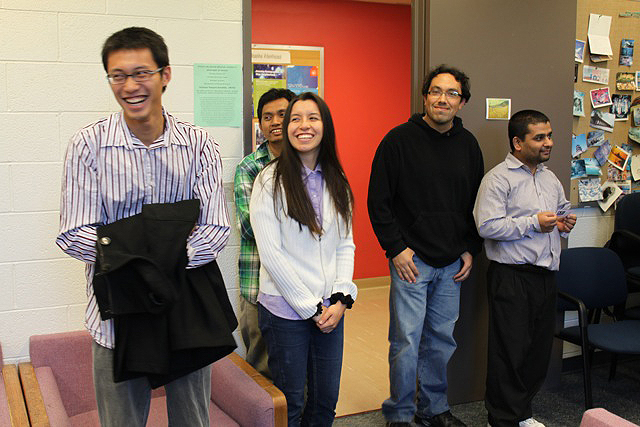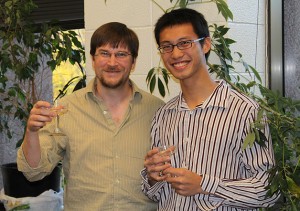Hsu ’10 Honored by American Physical Society

The American Physical Society awarded Chia Wei “Wade” Hsu ’10 with its prestigious LeRoy Apker Award for his achievements while at Wesleyan.
The American Physical Society awards the Apker Award to only one student from a Ph.D-granting institution each year. Reinhold Blümel, the Charlotte Agusta Ayres Professor of Physics, calls it a “mini-Nobel Prize.”
The award provides encouragement to young physicists who have demonstrated great potential for future scientific accomplishment.
“This means that Wade out-competed students from MIT, Stanford, Harvard, Princeton and CalTech,” says Wade’s former advisor Francis Starr, associate professor of physics. “He’s the best of the best.”
On Oct. 8, the Physics Department hosted a reception in his honor.
“The celebration that people in physics department threw for me was a total surprise. I did not expect an event with such a scale, with so many professors, grads, undergrads and cheese and wine,” he says. “I felt like crying that so many people came, and that they seemed to be even happier than me. It was great. And certainly I had never felted as honored as on that day.”
The Apker award came with a $5,000 award, an allowance for travel to the APS meeting where the award will be presented, and a certificate citing the work and school of the recipient. Wesleyan’s Physics Department also received a $5,000 award for nominating Hsu. These funds will be used to support undergraduate research.

While a freshman, physics and mathematics major Hsu became a member of the theoretical/ computational physics group, led by Starr. Wade’s research focused on creating new materials and nanostructure that self-assemble by using DNA to encode linking rules, instead of genetic information. To do this, he created custom-designed nano-“atoms” by attaching a specific number strands of DNA to nanoparticles. By controlling the sequence of these “arms,” he could control how arms of different nanoparticles link to spontaneously form complex networks. These new systems have potential applications from drug delivery and bio-sensing to nano-electronics and optics.
Hsu rapidly established himself, publishing five papers while an undergraduate, including a paper each in The Proceedings of the National Academy of Sciences USA and Physical Review Letters, the most prestigious journal in physics.
A Freeman Scholar, Hsu maintained his interest in East Asian culture while at Wesleyan, playing multiple instruments and even making time to tutor a middle school student on guzheng weekly for three semesters. He speaks three languages and has tutored himself in two more.
Hsu graduated first in his class last May with high honors in physics. He is currently a graduate student in physics at Harvard University.
“I haven’t joined a research group at Harvard yet, but when I do, it will probably also be in the broad field of soft condensed matter, same as the field I worked on at Wes,” he says.

